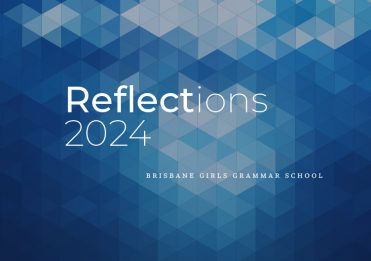As a member of the English Faculty, the cultural juggernaut that is Taylor Swift’s lyrical rumination on the pain of lost love seems particularly timely: after 50+ years as a mainstay of Senior English, Hamlet, Shakespeare’s Denmark-set magnum opus, is no more. Alas, we’ve had to bid a sorrowful farewell to our loyal Great Dane.
Why the melancholia? It’s a fair question. We’ve had ample time to say our goodbyes, with our venerable Director of English, Jo Genders, penning a powerful, reflective farewell to the Prince prior to our move into the next Era. Further, Hamlet’s replacement is yet another acclaimed tragedy: Othello. While not all of Shakespeare’s works are created equal—Titus Andronicus springs painfully to mind—the substitution of one great Tragedy with another hardly seems truly tragic. And yet, as 2024 opened without Elsinore on the horizon, I wondered: what was it about Hamlet that made it so difficult to shake off, and could Othello ever measure up?
For me, the value of Hamlet lay not in its lexical brilliance, but in how we engaged with its morally turbulent ‘hero’. The titular Prince could not be hated, but he was very difficult to love, and living with this liminality caused great consternation within my classes. This is not surprising, given evidence like the recent Channel 4 study of 13 to 24-year-olds [1] that baldly exposed a deeply embedded paradox of deep progressive attitudes and entrenched intolerance for competing perspectives. Respondent Georgia (22) noted the contemporary rise of the pervasive conception that the ‘only way to share (an) opinion is by convincing other people that (your) opinion is the only correct way’. This current trend toward schismatic didacticism is evident in the rise and subsequent Flanderisation [2] of ‘cancel culture’: particularly in digital discourse, with the notable exception of ride-or-die Swifties ready to forgive Blondie most sins, an abrupt heel-face-turn is not only common but oft expected when confronted with even a whiff of ideological opposition. While upholding personal integrity and using one’s voice to call for accountability are both positive concepts unto themselves, the speed of these contemporary 180s is likely to cause whiplash, and outcry does not always match the action. These are hardly champagne problems: such a trend seems to suggest that in modern culture there is good, there is bad, and the in-between shrivels and shrinks each day.
Ideally, students should emerge from their scholastic cocoon ready to engage independently, confidently, and empathetically with the world outside our white picket fence; while we encourage girls to discover their own perspectives and where they draw their own individual line(s), we must also develop their capacity to be open and tolerant of others’. Thus, to denaturalise rising black and white thinking, we grapple with the grey.
Enter Hamlet, stage left.
In years gone by, my classes have noted that the titular Prince’s ‘babygirl’ characteristics—a term evoking the conspicuously sweet sensitivity and gloriously floppy hair of Hugh Grant’s Notting Hill era—transcend time. Ostracised for little more than visible grief for his much-revered late father, Hamlet’s wholly natural behaviour is publicly derided as ‘unmanly’ and a ‘fault to nature’. The Prince is thus adrift and lonely, subsequently abandoned, neglected, or betrayed by those he loved best; by the time Hamlet cries ‘but break my heart’, he has already captured ours.
However, this straightforward sympathy never lasted.
Put simply, Hamlet’s Prince is no prince: he’s a deep thinker, loyal, and witty; but simultaneously he is bigoted, cruel, and tragically indecisive. At times, he seems little more than a nightmare dressed as a daydream. His supposed betrayal by his mother erupts in generalised misogyny—’Frailty, thy name is woman!’—and Reddit-esque complaints regarding women’s propensity to deceive: ‘God hath given (women) one face, and you make yourselves another.’ Complicating matters further is how Hamlet does not merely metamorphose from hero to villain across five acts; these deeply offensive statements—so casually cruel in the name of being ‘honest’—are inextricably entwined with those that evoked deepest sympathy.
This moral ambiguity caused both disquiet and discussion within my classes. Our hardly-heroic-hero prompted healthy debate: was Hamlet a ‘good’ person? How much of his cruelty could be explained or excused by his tragic circumstances? How much blame for the subsequent carnage could be placed at his indecisive feet? There were no black-and-white answers, only acknowledgement and acceptance of different perspectives; there was rarely group consensus but plenty of group understanding.
There was good, there was bad, and now there was Hamlet. It may have felt exhausting dealing with the anti-hero, but there were such rich results.
Thus, given what I considered likely lost with the Prince’s exile from the curriculum, I was poised to continue privately wallowing in pedagogical pity—certainly an apropos tribute to this particular Prince. However, in my brood-blind focus on the blank space of Hamlet’s absence, I had severely underestimated what was soon-to-be present.
Enter Othello, stage right.
Scarce but three weeks into Othello, I have found reason for powerful optimism; not only does the play prompt similar ruminations as its predecessor, but it delves deeper into territory heretofore unexplored in this space. This is particularly evident in our evolving discussions of race, with the play’s representation of the alienating vulnerability of Otherness—and how it can be cruelly weaponised to serve nefarious purposes—serving as an ever-so-timely and tragically literal condemnation of black-and-white thinking. Further, the ease with which the titular General slips into suspicion and paranoia prompts discussion that echoes Hamlet’s betrayal-driven misogyny: how much cruelty can one explain—or even excuse—as the psychological impact of lifelong prejudice?
In addition, outspoken Emilia—wife of the villainous Iago and handmaiden to doomed Desdemona—immediately gained a well-deserved Grammar fan club by denouncing endemic misogyny; this entry into Reputation-era bombast was something quite refreshing after the somewhat drippy and half-hearted nature of Hamlet’s women characters. However, much as with her Danish predecessor, it isn’t that simple: students are just now attempting to come to terms with how Emilia’s proto-feminist condemnations of the patriarchy—‘(men) are all but stomachs, and (women) all but food’—are coupled inextricably with a dogged desperation to ‘please (her husband’s) fantasy’ at the cost of her own integrity. The liminal space between their deep admiration for, and simultaneous alienation from, Emilia is what has prompted the most powerful discussion. Once more, questions are prompted with no right answers; once more, students experience not black and white, but screaming, contradictory colour.
Whether a handmaiden or Hamlet, Shakespearean characters seem to have a knack for prompting us to question the lines of morality we draw in the sand. The academic and pseudo-objective nature of textual analysis lures us into discussion characterised not by swift rejection and dichotomous disagreement, but by the open and respectful acknowledgement of alternative perspectives.
And so, it appears our future—if not that of Othello’s characters—is looking brighter than ever. While the ghost of Hamlet will still wander the midnights of mental battlements, Othello’s sun is rising, and I look with fearless optimism to an exciting new pedagogical day.
Exeunt.
References
Booth, Robert (2022). ‘It’s out of order’: Gen Z speak up for cancel culture and ‘young illiberal progressives’. The Guardian. https://www.theguardian.com/society/2022/nov/01/its-out-of-order-gen-z-speak-up-on-cancel-culture-and-young-illiberal-progressives
[1] To be clear, I do not believe this trend—labelled “illiberal progressivism”—is exclusive to younger generations; such narrow attribution would be an act of deleterious scapegoating. One could argue that many studies focus on Gen Z and Alpha because the effect of such hard-line attitudes is increasingly visible in the ideological violence that characterises contemporary generational clash.
[2] Referring to the character of Ned Flanders on The Simpsons, this term implies a process by with the essential traits of a character or concept are exaggerated and hyperbolised over time to reach a caricature of its former self.




